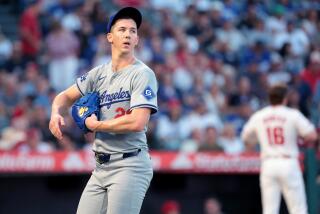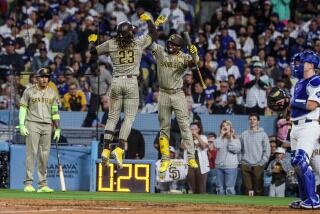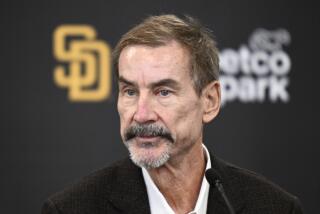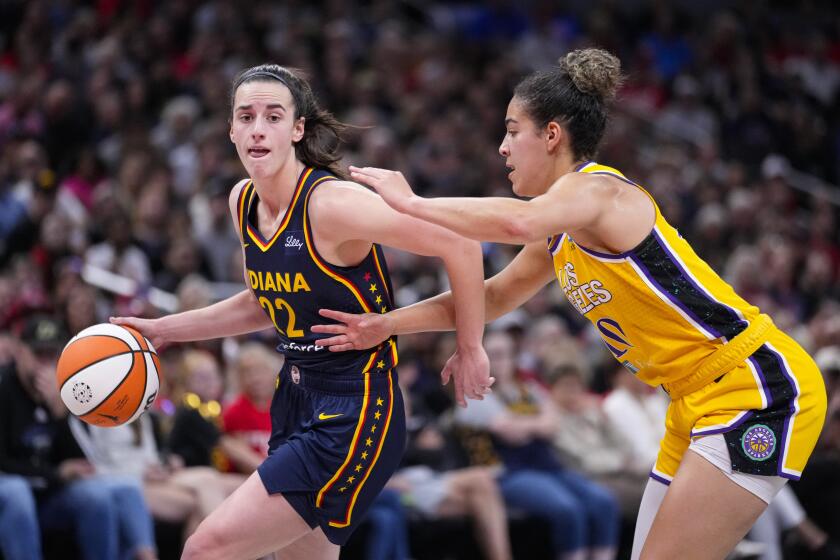Padres’ Royster Has Bought His Way Into the Utility Market
YUMA, Ariz. — Jerry Royster is an honest-looking man, the kind of guy you’d easily be tempted to buy something from.
Yet throughout his baseball career, Royster has not been able to completely sell most people on himself.
In the mid-70s he had hoped to be the Dodger third baseman, but Ron Cey already was there. He then became the Atlanta Braves third baseman, but Bob Horner appeared soon thereafter.
Royster finally won Atlanta’s left-field job in late 1982, but Brett Butler came along the next year to take it away. And last season, Royster simply wanted to get away from Atlanta as soon as possible after his contract expired.
He’s been with the Padres for just two months, and already he’s having trouble selling people on one thing: that Pascual Perez did not intentionally hit Alan Wiggins last Aug. 12 to start the Beanball War in Atlanta.
“Pascual told us after the game he did not hit Alan on purpose,” Royster said. “I personally don’t think he was trying to hit Alan. I told Alan that recently, but he didn’t accept it. If I was him, I don’t think I would accept it, either.”
Most players undoubtedly would feel the same way as Wiggins. Long before the beanball incident occurred, Perez was known for pitching inside to batters and was widely disliked for his antics on the mound.
Royster said he eventually came to accept Perez for what he was. He does not dislike Perez, which puts him in the minority among the Padres.
“If he’s not on your team, you won’t like him much,” Royster said. “I’d say 98% of the people in baseball don’t understand him, and the other 2% accept him because he’s on their team. If he strikes me out and jumps up and down, I know for a fact he’s not trying to embarrass me. That’s the way he is, but it just doesn’t look right. He suffers the consequences for it.”
The consequences included Padre pitchers throwing at Perez in four straight at-bats. And Royster thinks the Atlanta-San Diego feud will continue.
“I think there will probably be bad blood between the teams,” Royster said. “I think the rivalry is caused mostly by two teams being the best in their division. The facts that someone got hit and there was a fight has to continue the rivalry, especially with the fans. But it will all come down to who can hit and field the best.”
Throughout Royster’s career, he has been labeled as “adequate.” The problem has been that somebody more adequate always has come along to take his place.
After Horner took over from Royster at third base, the Braves moved Royster to second. Glenn Hubbard took over at second, so Royster became the shortstop until Rafael Ramirez arrived.
After a while, it became painfully obvious to Royster what was happening.
“It wasn’t so bad, except I was always doing someone else’s job,” Royster said. “I could see what it was leading to. If guys were doing well at other positions, I would be out of a job.”
When Royster first rode the merry-go-round, he thought utilitymen were regarded as “peons.”
But in the last five years, he said, utility players have taken on more important roles.
Since Royster was among the forerunners in this new breed, he pridefully refers to some utilitymen as Jerry Royster-type players. He said the group includes Derrel Thomas, Lee Lacy and Joel Youngblood.
“I don’t even know how I became that type of player,” the 32-year-old Royster said. “I was signed by the Dodgers as a third baseman. I never played second base, shortstop or the outfield. The needs of our team caused me to play those positions. Then, I saw other teams starting to do the same thing with players. There is a market for this type of player now. There wasn’t a market for it five years ago.”
When Padre Manager Dick Williams was playing 25 years ago, he was a utilityman. But a utility player then was much different than one now.
“Back then, a utility player was not as specific of an ingredient to a ballclub,” Williams said. “I was a utility player my whole career, and (Padre third base coach) Ozzie Virgil was the same way. I got in 14 seasons doing that and feel very lucky. Utility players are counted on more heavily now.”
Primarily, Royster will platoon at third base with the left-handed hitting Graig Nettles. Royster also will be a fill-in at shortstop, second base and the outfield as well as being a pinch-hitter.
San Diego obtained him in January as a free agent after Luis Salazar, a utilityman last year, was traded to the Chicago White Sox in the LaMarr Hoyt deal.
“Salazar had a lot of talent,” Williams said. “He didn’t like sitting the bench, which you can’t blame him for. Jerry is used to this role. He knows his duties, and he knows that he will see a lot of action.”
When the Braves won the National League West title in 1982, Manager Joe Torre said Royster was his most valuable player down the stretch. From July 29 until the regular season’s end, Royster batted .330 and drove in 22 runs as the starting left fielder.
However, he was back on the bench at the outset of 1983.
“That was as disappointed as I have ever been,” Royster said. “We won the division the year before with me in left field and I was praised by everyone, including the manager. That’s when it became pretty definite I didn’t want to be there. I wanted a shot at being a regular.”
Consequently, Royster said he was unhappy as a utility player the last two seasons with Atlanta.
So, why is he content to be a backup with the Padres this year?
“I won a job in Atlanta,” Royster answered. “I was the manager’s MVP one year then not good enough to play in spring training the next year. The team is set up here with the Padres, but I know my role is as a utility player. They haven’t taken anything away from me here like they did in Atlanta.”
Now all Royster has to do is sell himself to Dick Williams. He was not able to do that with Joe Torre in Atlanta.
More to Read
Go beyond the scoreboard
Get the latest on L.A.'s teams in the daily Sports Report newsletter.
You may occasionally receive promotional content from the Los Angeles Times.










